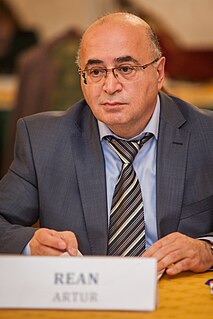
Albert Nalchajyan (born August 22, 1939 in Gyumri (Leninakan), Armenia) is an Armenian psychologist. [1] Spheres of his scientific interests include Psychology, Ethnology and Philosophy.

Albert Nalchajyan (born August 22, 1939 in Gyumri (Leninakan), Armenia) is an Armenian psychologist. [1] Spheres of his scientific interests include Psychology, Ethnology and Philosophy.
Albert Nalchajyan was born on August 22, 1939, in Leninakan (now Gyumri), as a second child of the family. His father Aghabek S. Nalchajyan was a teacher of Russian Language and Geography, his mother Arusyak H. Nalchajyan got a secondary education, she mainly engaged herself in the education of her children. [2] [3]
After leaving the secondary school, Albert Nalchajyan enters the mechanico–mathematic faculty of the Yerevan State University, best however, shows greater and greater interest to the humanitarian sciences. After graduating from the University, for a period of 2 years he works as an engineer, but in 1964 he enters the post – graduate studentship on psychology of the Yerevan State Pedagogical University after Kh. Abovian and all his further life connects with psychology. From 1968 to 1981, he worked in the Institute of Foreign Languages after the name of V. Brussov (Yerevan) as a lecturer of psychology, then as assistant professor and as a Head of the Department of Psychology. From 1974 to 1976 he was the President of the Armenian Psychological Society. From 1981 to 1996 A. Nalchajyan worked in the Institute of Philosophy and Law of the Academy of Sciences of Armenia as the Head of the Department of Psychology. [4] From 1996 to 1997 was the Fellow of Fulbright in the Fordham University (New York, USA). After returning to Armenia he founded a Research Center of Psychology and at present is the Head of this Center.
The main spheres of his scientific interests are:
In his numerous works has brought forth a number of scientific hypothesis and theories, the main of which are the following:
Albert Nalchajyan [5] is the author of four university textbooks and three textbooks of psychology for secondary school of Armenia. About 30 years he worked as a lecturer of psychology in several universities of Armenia. At present he is involved in research works in psychology. Albert Nalchajyan is a member of several international scientific organizations. Is married and is a father of three children.

Social psychology is the scientific study of how the thoughts, feelings, and behaviors of individuals are influenced by the actual, imagined, and implied presence of others, 'imagined' and 'implied presences' referring to the internalized social norms that humans are influenced by even when they are alone.

Psychology is an academic and applied discipline involving the scientific study of human mental functions and behavior. Occasionally, in addition or opposition to employing the scientific method, it also relies on symbolic interpretation and critical analysis, although these traditions have tended to be less pronounced than in other social sciences, such as sociology. Psychologists study phenomena such as perception, cognition, emotion, personality, behavior, and interpersonal relationships. Some, especially depth psychologists, also study the unconscious mind.

Albert Bandura was a Canadian-American psychologist who was the David Starr Jordan Professor Emeritus of Social Science in Psychology at Stanford University.

The Armenian Soviet Socialist Republic, also commonly referred to as Soviet Armenia or Armenia was one of the constituent republics of the Soviet Union in December 1922 located in the South Caucasus region of Eurasia. It was established in December 1920, when the Soviets took over control of the short-lived First Republic of Armenia and lasted until 1991. It is sometimes called the Second Republic of Armenia, following the First Republic of Armenia's demise.

Shirak, is a province (marz) of Armenia. It is located in the north-west of the country, bordering Turkey in the west and Georgia in the north. Its capital and largest city is Gyumri. It is as much semi-desert as it is mountain meadow or high alpine. In the south, the high steppes merge into mountain terrain, being verdant green in the spring, with hues of reddish brown in the summer. The province is served by the Shirak International Airport of Gyumri.
Alexei Nikolaevich Leontiev, was a Soviet developmental psychologist, philosopher and the founder of activity theory.
Passive-aggressive behavior is characterized by a pattern of passive hostility and an avoidance of direct communication. Inaction where some action is socially customary is a typical passive-aggressive strategy. Such behavior is sometimes protested by associates, evoking exasperation or confusion. People who are recipients of passive-aggressive behavior may experience anxiety due to the discordance between what they perceive and what the perpetrator is saying.

Gyumri is an urban municipal community and the second-largest city in Armenia, serving as the administrative center of Shirak Province in the northwestern part of the country. By the end of the 19th century, when the city was known as Alexandropol, it was one of the largest cities of Russian-ruled Eastern Armenia with a population similar to that of Yerevan. It was renamed to Leninakan during the Soviet period. The city's population grew above 200,000 prior to the 1988 Spitak earthquake, when it was devastated. As of the 2011 census, the city had a population of 121,976, down from 150,917 reported at the 2001 census.

Yerevan State University, also simply University of Yerevan, is the oldest continuously operating public university in Armenia. Founded in 1919, it is the largest university in the country. It is thus informally known as Armenia's "mother university". Of its 3,150 employees, 1,190 comprise the teaching staff which includes 25 academicians, 130 professors, 700 docents, and 360 assistant lecturers. The university has 400 researchers, 1,350 post-graduate students, and 8,500 undergraduates, including 300 students from abroad.

Yerevan Brusov State University of Languages and Social Sciences, is a public university in Yerevan the capital of Armenia, operating since 1935. It is named after the Russian poet and historian Valery Bryusov since 1962.

The Russian 102nd Military Base is a Russian military base in Gyumri, Armenia, under the command of the Southern Military District of the Russian Armed Forces.
Anne C. Campbell was a British academic and author specializing in evolutionary psychology. Her research was largely concerned with sex differences in aggression between men and women. She was professor of psychology at Durham University.

Movses Khorenatsi was a prominent Armenian historian from the period of Late Antiquity and the author of the History of Armenia.

Aram Bagrati "Bagratovich" Nalbandyan was a Soviet Armenian physicist, prominent in the field of physical chemistry, founder of the Institute of Chemical Physics in Yerevan, Armenia, and academician-secretary of the Chemical Department of the Armenian Academy of Sciences (AS). He is the author of more than 400 scientific articles and five monographs.

The Karin dialect is a Western Armenian dialect originally spoken in and around the city of Erzurum, now located in eastern Turkey.

The May Uprising was a coup d'état attempt by the Armenian Bolsheviks that started in Alexandropol on May 10, 1920. It was eventually suppressed by the Armenian government on May 14 and its leaders were executed.

Sedrak A. Sedrakyan is an Armenian psychologist, doctor of Psychological Sciences, and professor.

Gayane Hovhannisyan is an Armenian linguist, Doctor of Sciences in Philology/Linguistics (2000), Professor (2005).

Arthur Alexandrovich Rean is a Russian psychologist, considered to be one of the founders of social pedagogical psychology. In 2016-2020 he was appointed Head of the Laboratory for Prevention of Antisocial Behaviour in the Institute of Education of HSE. Since 2020, he is Head of The Center for sociolization, family and prevention of antisocial behavior research of the Institute of Pedagogy and Psychology, MPGU.